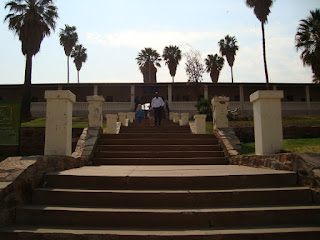During our fourth week, academic reality set it as we had our first full week of classes and began learning the language of Damara from Baby, a former Peace Corps language teacher. We will be staying with a rural family later who speaks Damara. In addition to dealing with the stress of classes and homework, we began our 10-day urban homestay. This homestay was more difficult than the homestay in Soweto because we were flying solo in a foreign culture and didn’t have another student for support. We concluded that there is no one “Namibian family”; tribe, race, and language played a major difference in the family makeup. For example, some students lived with Damaras while others lived with Ovambos. Some students had a distinct advantage by practicing Damara with their host families. Other students lived in the historically “colored” area of Khomasdal, while other students lived in the “black” township of Katutura. During our homestays, we were introduced to English-dubbed Spanish telenovelas, referred to as “Soapies”. Most students quickly developed favorite characters from the two most popular shows, “Lorenzo’s Wife” and “Storm over Paradise.”
 In Development class, Herbert Jauch from the Labor Resource and Research Institution spoke about development in Namibia and the vast level of inequalities that make Namibia number one on the GINI scale. He promoted a Basic Income Grant (BIG) to jumpstart the process of narrowing inequality by giving each Namibian 100 dollars a month from birth until the age of 65 when individuals would qualify for their pension. We can see more than one side to this proposal: some students think that it is a wonderful idea and would benefit those poor Namibians, while others are more concerned about the potential problems in restructuring the taxation system. He also proposed fair land distribution, pointing to Zimbabwe as an example of what happens due in part to unresolved land issues.
In Development class, Herbert Jauch from the Labor Resource and Research Institution spoke about development in Namibia and the vast level of inequalities that make Namibia number one on the GINI scale. He promoted a Basic Income Grant (BIG) to jumpstart the process of narrowing inequality by giving each Namibian 100 dollars a month from birth until the age of 65 when individuals would qualify for their pension. We can see more than one side to this proposal: some students think that it is a wonderful idea and would benefit those poor Namibians, while others are more concerned about the potential problems in restructuring the taxation system. He also proposed fair land distribution, pointing to Zimbabwe as an example of what happens due in part to unresolved land issues. 
We visited the Alte Feste Museum, a former German fort with information about rock drawings, the liberation struggle, and colonialism. Later in history class, we watched a BBC movie on the Herero genocide of 1904 and found out that the museum we had visited earlier was in fact a concentration camp for the Herero people. The students were dumbfounded that our tour guide did not mention that the fort was a concentration camp; we assumed that information would be a key part of museum
 presentation. We feel this example underscores the idea that history is selectively created from events strung together based on a certain perspective. A speaker in the BBC movie, Professor Kerina, the first Namibian UN representative, came to our class to speak about the liberation struggle and the challenges following independence. Saying, “only dogs and slaves are named by their masters. Free men name themselves,” Kerina emphasized the need for a country to choose its name.
presentation. We feel this example underscores the idea that history is selectively created from events strung together based on a certain perspective. A speaker in the BBC movie, Professor Kerina, the first Namibian UN representative, came to our class to speak about the liberation struggle and the challenges following independence. Saying, “only dogs and slaves are named by their masters. Free men name themselves,” Kerina emphasized the need for a country to choose its name.







